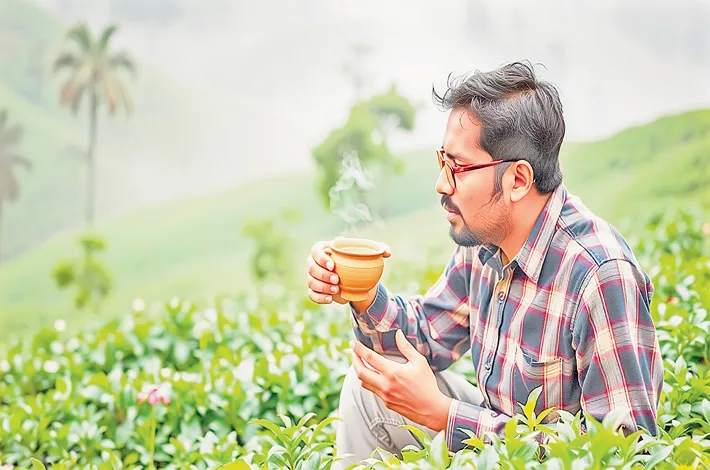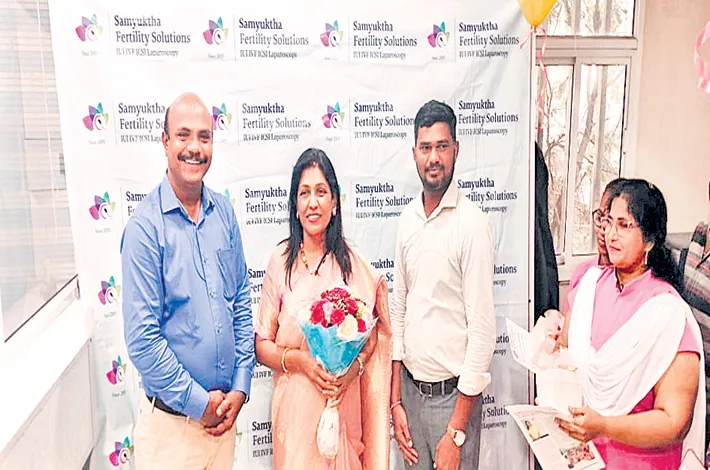Echoes of the Brahmaputra
25-09-2025 12:00:00 AM

In the emerald embrace of Jorhat's tea gardens, where the morning mist clung to the rolling hills like a lover's sigh, Arjun sipped his strong chi from a clay kulhar. The air was thick with the scent of damp earth and blooming jasmine, a symphony that only Assam could compose. At twenty-four, Arjun was a simple man—a supervisor in the estate, his days spent plucking leaves under the relentless sun. But his heart belonged to the rhythms of Zubeen Dada, those soul-stirring melodies that turned the mundane into magic.
It was a lazy Sunday in the heart of monsoon season when she appeared. Riya, with her raven hair tied in a loose braid and eyes like the deep brown of the Brahmaputra at dusk, had come from Guwahati to visit her aunt's estate. She wandered the misty paths, earphones in, lost in "Anuradha"—Zubeen's haunting ballad of unspoken longing. "Tumi mor anuradha, mor hridoyor xopno..." she murmured, her voice soft against the rustle of leaves.
Arjun, pruning a bush nearby, froze. That voice—it carried the same ache he felt every time he played the song on his battered radio. He straightened, wiping sweat from his brow, and caught her eye. She blushed, pulling out one earphone, but he smiled, wide and unassuming. "Zubeen Dada, hoi? 'Anuradha'—eta mor favorite. Tumi o fan?"
Riya's surprise melted into a grin. "Ho, absolutely! The way he sings about love that's so close yet feels like a dream... it's like he stole words from my heart." She was twenty-two, studying literature in the city, but here, amid the tea bushes, she felt alive, unscripted.
They talked as if the mist had woven them together. Arjun shared how "Anuradha" got him through his father's illness two years back—the lyrics a balm for nights when grief clawed at his chest. Riya confessed it was her breakup anthem, a reminder that love wasn't possession but a gentle haunting. By noon, they were walking the garden trails, trading verses like secrets. "O, mor priyo, tumi kotha jaao?" Arjun sang the line from "Tumi Jodi Aji," his voice gravelly but true, and Riya joined, her tone light and lilting, harmonizing as if they'd rehearsed a lifetime.
As the sun dipped, they reached the edge of the estate, where the Brahmaputra stretched like a silver vein through the land. The river murmured its eternal song, and Arjun pulled a small Bluetooth speaker from his bag. "Ekhon, 'Boroxa Jetiya Name' shunbo?" he asked, eyes twinkling. Riya nodded eagerly, and soon Zubeen's voice filled the air: "Boroxa jetiya name, mor hridoyot tumi..." It spoke of a love worn thin by distance, yet unbreakable.
They sat on a weathered bamboo mat, feet dangling over the bank. Riya leaned back, her salwar brushing his jeans. "You know, in Guwahati, I go to every Zubeen concert. Last year, at the Rongali Bihu, he sang this live—goosebumps, Arjun. But here, with you, it feels... personal."
Arjun's heart raced like the river's current. He'd never met anyone who understood the pull of those songs, how Zubeen wove Assamese soul into every note—the pangs of separation, the joy of reunion. "Moi o, Riya. But tumi... tumi jeno mor 'Dure Dure'r xopno. Far yet so near." He quoted the song's tender plea, his hand brushing hers accidentally—or was it?
The sky darkened, and the first raindrops fell, fat and insistent. They scrambled under a sprawling banyan, laughing as water soaked their clothes. But the storm didn't stop; thunder rolled like a jealous rival. Huddled close, Riya shivered, and Arjun draped his jacket over her shoulders. In the dim light, filtered through leaves, her face glowed. "Arjun, eta ki bhoy? Rain with Zubeen—perfect, no?"
He swallowed, the words of "Etiya Hiya Mur" bubbling up unbidden. "Tumi mor mathu mur, etiya hiya mur..." My head, my heart—you are. The rain pounded, drowning the world, but not them. Emboldened, Arjun turned to her. "Riya, since morning, tomar hasi, tomar gaan—eta jeno Zubeen Dada'r kobita. Moi tomak bhal pao. Not just fan, but... more."
Her eyes widened, then softened, mirroring the river's calm after a storm. She cupped his cheek, raindrops tracing paths like tears of joy. "Arjun, I've been humming 'Anuradha' thinking of someone like you. Someone who sees the poetry in our land, in our songs. I love you too—tomak bhal pao, etia."
They kissed then, slow and sweet, tasting of rain and tea leaves, Zubeen's voice fading into the background as their own melody began. The storm passed, leaving a rainbow arching over the Brahmaputra, a promise painted in Assamese hues.
Weeks blurred into stolen moments. Arjun sneaked into Jorhat town on weekends, where they'd meet at a dhaba, belting out "Gaane Ki Aane" over plates of pitha and fiery masor tenga. Riya sent him voice notes reciting lyrics during her lectures, and he'd reply with recordings from the fields, his voice roughened by the wind. Their love grew like the tea plants—rooted deep, branching wild.
One evening, as fireflies danced along the riverbank, Arjun knelt, a simple silver payal in hand, engraved with a line from "Nijanot Pritir Xubax": My love's own fragrance. "Riya, let's make our story a Zubeen song—endless, evergreen."
Tears glistened in her eyes as she nodded. "Yes, Arjun. With you, every day's a concert."
Under the stars, with the Brahmaputra as witness, they danced to an imaginary tune, hearts synced to the beat of Assam's beloved Dada. In a land of mists and melodies, they'd found their duet—timeless, unbreakable.








